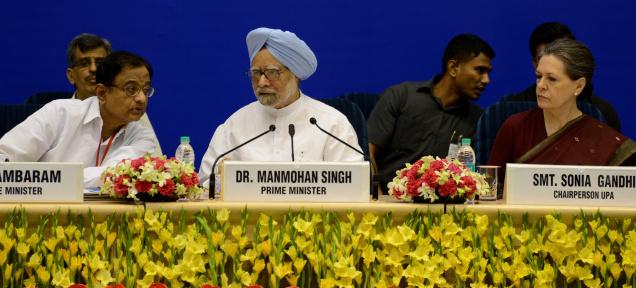NEW DELHI, September 24: Rising communal tensions in the country remained the focus of the National Integration Council (NIC) meeting here on Monday with Prime Minister Manmohan Singh cautioning political parties not to take mileage from sectarian violence. He reminded the States that onus lay on them to deal with communal riots and ensure that all the guilty were punished.
“The State government should lose no time to control communal violence sternly … The local administration should prevent a small issue from snowballing into a huge controversy. The State should use all means at its disposal to punish those guilty for fanning communal violence and ensure a speedy crackdown on such elements irrespective of their political affiliations or influence,” Dr. Singh said addressing Chief Ministers, important political leaders and other stakeholders at the meet.
The 16th NIC meeting, which was held in the backdrop of the Muzaffarnagar riots that led to displacement of thousands of people in western Uttar Pradesh, saw Congress Chief Ministers and their counterparts from the parties supporting the UPA government pointing to attempts at communally polarising the nation ahead of the 2014 general elections. However, Chief Ministers of the BJP-ruled States, along with the parties which are partners in the NDA, blamed vote-bank politics for the rising communal tempers.
In his concluding remarks, Union Home Minister Sushilkumar Shinde asked the States to step up vigil and take pre-emptive measures to prevent communal violence. “There should be zero tolerance for elements which incite communal passions and the state machinery should strictly enforce the laws to promptly apprehend the culprits and nip the trouble in the bud.”
Accusing the main political parties of trying to “dangerously disturb” the communal harmony and polarise voters in Uttar Pradesh ahead of elections, Chief Minister Akhilesh Yadav said his government would take stern action against those trying to disturb peace. He termed the demolition of Babri masjid in Ayodhya a “black chapter” in the history of India that had affected communal harmony in the State.
Maharashtra Chief Minister Prithviraj Chavan and his counterpart from Jammu and Kashmir Omar Abdullah, and Bihar Chief Minister Nitish Kumar cautioned against attempts to polarise voters on communal lines. “A multiparty democracy invariably leads to competitive politics aimed at cornering a larger share of votes. But we must ask whether it should necessarily lead to a passionate persuasion of a divisive agenda. Doing so may deliver short gains for some, but it eventually leads to the weakening of basic premise of our nation itself,” Mr. Kumar observed.
However, BJP Chief Ministers Raman Singh (Chhattisgarh) and Shivraj Singh Chouhan (Madhya Pradesh) said parties should leave behind politics of vote bank and concentrate on development and growth while providing equal opportunity to all without any discrimination. “Our view is that justice is for everybody, opportunities are for everyone and refusal to no one. Our vision is clear. We believe that the immediate frenzy of communalism has a root in vote-bank politics,” said Mr. Chouhan.
NDA constituent, the Akali Dal, raised the 1984 anti-Sikh riots and said the failure of the system to deliver justice even after 30 long years had caused deep resentment and led to a dangerous alienation. The biggest confidence-building measure was to ensure justice in aftermath of communal violence.
CPI(M) general secretary Prakash Karat noted that the recent riots were not “spontaneous outbreaks but part of a planned effort … designed by certain communal-political forces. The 2014 Lok Sabha elections seem to be a catalyst for communal activities. It can be easily identified who seeks to gain out of such communal polarisation.”
Asking the Centre to immediately pass the Prevention of Communal Violence Bill, he said: “Given the history of communal politics in India, it [communal violence] is primarily a political issue and it must be dealt with politically.”

